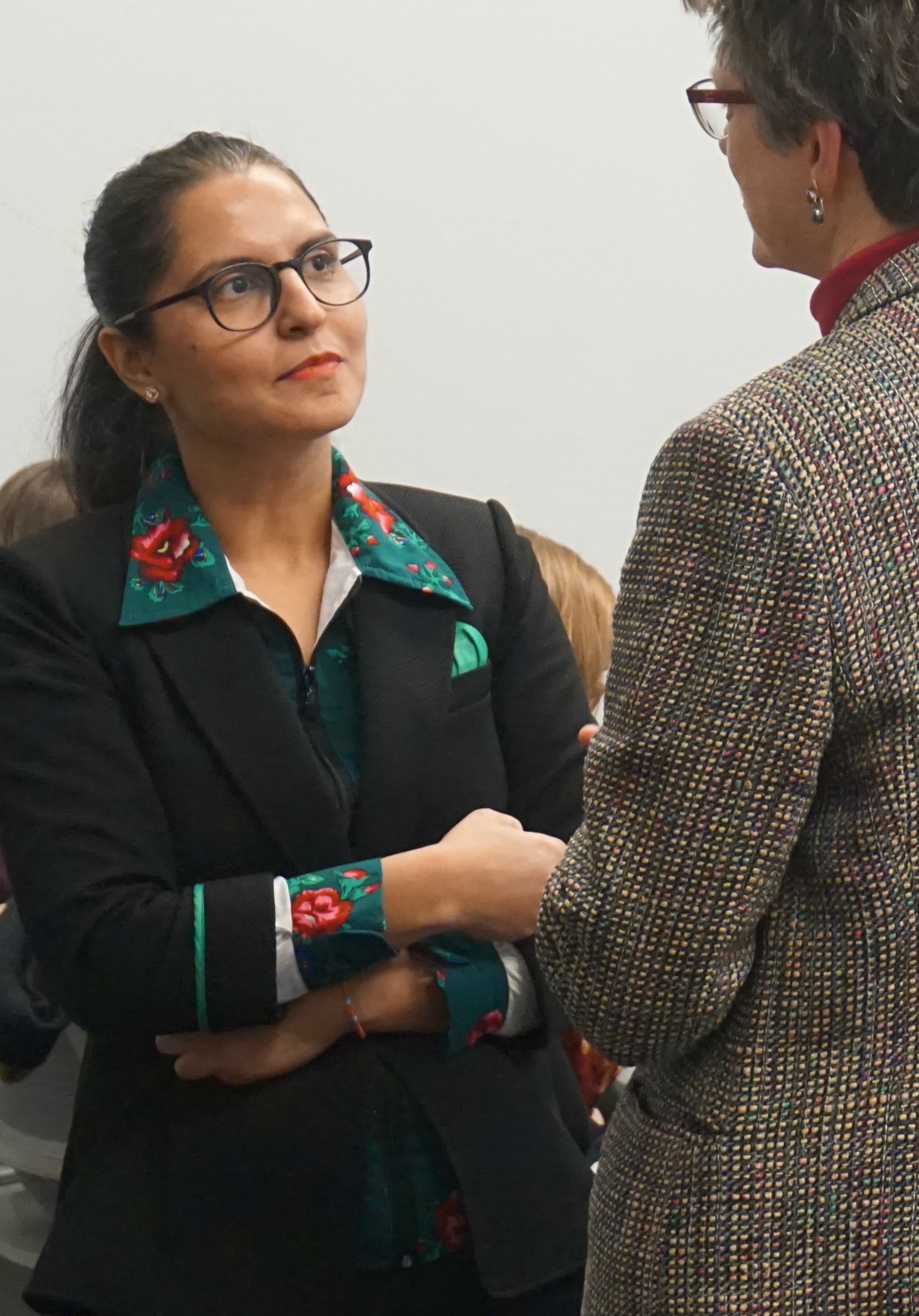Dr. Margareta Matache was a speaker at the Helsinki Commission’s February 16, 2017 panel discussion on the challenges faced by Romani communities in Romania. The event followed a screening of the acclaimed Romanian film “Aferim!” (“Bravo!”), which addresses the forgotten history of 500 years of Roma slavery in two former Romanian principalities.
Margareta is a Romani activist and scholar from Romania with over 18 years of experience in the field of human rights. She joined the Harvard FXB Center for Health and Human Rights team in 2012, where she currently works as an instructor and director of the Roma Program.
Before this position, for seven years Dr. Matache served as the executive director of Romani CRISS, a leading Romani non-profit in Romania.
Margareta grew up under the first wave of Romani activism in post-communist Romania. Her father, a construction worker of Romani descent, was a community activist himself, which played a role in fostering her interest in the field of human rights.
“This activist environment taught me about our ancestors, some of whom on my mother’s side may have been slaves, and so I am trying to document that now,” she says.
Margareta was the first child in her family and community to attend high school. She has a B.A. in Social Work, an M.A. in European Social Policies and a PhD, magna cum laude, from the University of Bucharest. However, her educational path was no easy feat.
“As an adolescent, I felt the pressure and pain of race and class constructs and wanted to drop out from school way too often,” she admits.
She says that those feelings later became one of the triggers of her motivation to dedicate a large portion of her work to fighting racism and stigma against Romani adolescents.
Margareta became involved with the Romani movement in 1999 as a volunteer for the Roma Students Association, working with association director Emilian Nicolae in a local community in Bucharest. Six years later, she became the executive director of Romani CRISS.
“Taking a stand in cases of anti-Roma racism was at the core of our work at Romani CRISS,” Margareta says. Since the 1990s, the organization has documented countless cases of Romani rights violations which were later ruled upon by the European Court of Human Rights (ECHR) and included in reports from Amnesty International, the U.S. State Department, and other institutions.
“In 2006, we assisted the community in the town of Apalina, after the police used violence against 37 Roma, including elders. Based on a complaint filed by Romani CRISS, the ECHR condemned the way the Romanian government had conducted the investigation and awarded the victims €192,000 in damages,” she recalls.
Yet, she also recalls that they lost cases before the court in many instances. “We had quite a lot of failures or so called ‘lessons learnt,’” she adds.
Margareta’s work was also dedicated to fostering the right to education. “When I took over the Romani CRISS leadership, I continued prioritizing the issues of Romani children segregated in separate schools and classes from their non-Roma peers. We set up a coalition of five renowned nonprofit and intergovernmental organizations that worked with the Ministry of Education to develop a legal document that prohibits segregation. In 2007, our advocacy led to the issuing of a School Desegregation Bill,” she recounts.
In 2011, along with other partners, Margareta’s organization convinced the Romanian Parliament to include an article that targets the misdiagnosis and abusive placement of children in special schools based on their ethnicity or another discriminatory criterion in the new Education Law.
Despite these successes, Margareta feels that there is still a lot to be done as Romani children continue to be placed in segregated schools and classes to this day.
In 2012, Margareta decided to take a break from activism and shifted to academia. At the Harvard FXB Center for Health and Human Rights, she has been pursuing and piloting participatory approaches for assessing the needs of Romani youth and suggest better-informed policies and measures. Moreover, the Roma Program has provided support for Romani and non-Romani youth to conduct culturally sensitive and participatory research.
Margareta is also contributing to strengthening ties and joint advocacy efforts between Roma and other social movements, working on reparations claims across historical and geographical spheres. Slavery in Romania is an example of past state-sponsored injustices around which Margareta’s program try to create awareness and solidarity.
“Romania has not even advanced symbolic reparations, including memorials, museums to acknowledge this episode in our country history. Roma and Romanian children are simply deprived from learning about this central episode in their collective history. We need to help the next generations of children, Roma and non-Roma, to learn about the origins of the present-day biases, racist behaviors, and also, to understand the effects of the unseen gadjo or non-Roma privilege,” she says.
Margareta also champions the idea to use films and other artistic productions as a tool to ignite discussions and raise awareness of difficult topics.
She points out that “Aferim!” helped lay the foundations for the acceptance, recognition, and memorialization of the past of injustice in Romania.
“It was remarkable to me that the film was produced and directed by fellow Romanians, who told the world the hidden truth about the uncomfortable past of 500 years of slavery on Romanian territories. I think that ‘Aferim!’ started the public conversation on the history of slavery while The Great Shame, a play written and directed by the brilliant mind of Alina Serban, continues the conversation on slavery and takes a step further, by looking at the past through the eyes of the present,” she says.
According to Margareta, what makes the film exceptional is that “‘Aferim!’ shifts the emphasis on the non-Roma and their moral responsibility for past injustices and the roots of present-day injustice, including exploitation and discrimination, pulling to pieces the discourse on Roma vulnerability and the ‘Roma problem.’”
“We would not need any integration policy if we benefited from a just treatment throughout our history, she says. “‘Aferim!’ speaks, in many ways, to all embedded biases in our Romanian culture, and also mocks them in a manner that could potentially help Romanians understand present-day discrimination against Roma and other groups, and how ridiculous and outdated racism should be.”
Asked why learning about Roma is important for Americans, Margareta points out that there is a need to build solidarity with the Roma. However, she also stresses that Romani communities face stigmatization on the American soil as well:
“There is an idea in the U.S. that the gypsies are not a people; it’s rather a way of life: bohemian, free spirit. The truth is that we have quite a large Romani population here in the United States, about a million people. Also, reality shows, Hollywood movies, and many other cultural products continue to portray Roma solely in stereotypical images and that adds to the stereotypical ways in which some Americans perceive this population. Fearing stigma, many Roma in the U.S. hide their identity. In this context, there is a need for mobilization of Romani people in the U.S. in view of building a new discourse to balance the stereotypical ways in which some Americans perceive this population.”





